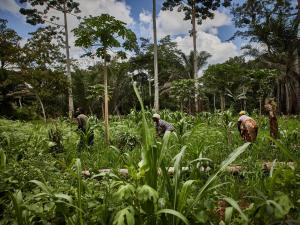Preserving biodiversity, health and environment
Brazzaville – The emergence and spread of zoonotic diseases is a pressing concern for public health and environmental conservation in an increasingly interconnected world.
Recognizing the critical role of ecosystems in human survival, leaders and representatives from the world’s three largest tropical biodiversity ecosystems – the Amazon, the Congo and the Mekong-Delta River basins – are meeting this week in Brazzaville to discuss the complex relationship between forest ecosystems and human well-being.
Healthy communities rely on well-functioning and biodiverse ecosystems. These provide clean air, fresh water, medicines, food and nutrition security and support critical ecosystem functions and services such pest and disease regulation, pollination, climate regulation, and mitigating the impacts of extreme events.
Forests also provide other key services to human health such as acting as natural watershed wardens and regulators of both quantity and quality of water in our rivers, streams and lakes. As our landscape changes, it impacts stream health, challenging the capacity of human communities to produce food and obtain drinking water.
Healthy forests are essential to maintaining the ecosystem services that sustain life. The depletion of key natural forest ecosystems, including the savannah and other types of non-dense tropical growth – risk tipping the delicate balance in the animal-human interface; as ecosystems degrade, the likelihood of emergence and spread of zoonotic diseases such as Ebola and Rift Valley fever increases.
“The human disturbance of ecosystems and ensuing biodiversity loss are increasingly linked to the occurrence of zoonotic and vector-borne diseases outbreaks,” said Dr Matshidiso Moeti, WHO Regional Director for Africa during the 26–28 October 2023 summit in Brazzaville. “The COVID-19 pandemic, with its devastating impact on health, lives, and national economies dramatically showed why addressing these risks is critical.”
Hotspots of biodiversity such as the Amazon, the Congo and the Mekong-Delta River basins are regions with extraordinarily high levels of species diversity and endemism. But habitat devastation, deforestation and climate change are exerting considerable pressure on these regions.
To help address these challenges, WHO, the United Nations Environment Programme, the Food and Agriculture Organization of the United Nations and the World Animal Health Organization are working together through One Health approach that combines their expertise to assist countries to tackle the health threats in the animal, environment and human domain.
“Coordinated, integrated, multisectoral strategies, such as One Health, that acknowledge the interdependence of human, animal and environmental health, must be embraced by all,” said Dr Moeti.
At the WHO Regional Office for Africa, efforts are ongoing to encourage countries to adopt and implement One Health approach to strengthen integration and inter-sector cooperation to prevent, detect and respond to emerging infectious disease threats, particularly zoonotic diseases and antimicrobial resistance.
This strategy can be supplemented by biodiversity conservation, enhanced surveillance and monitoring, stringent regulations on wildlife trade, as well as public education to empower individuals to make informed decisions regarding their interactions with wildlife and sustenance sources.
Our ability to combat zoonotic diseases is depends on international cooperation and proactive measures. By recognizing the intricate web of factors that contribute to the emergence and spread of zoonotic diseases, we can work together to protect public health and the biodiversity of the planet.



